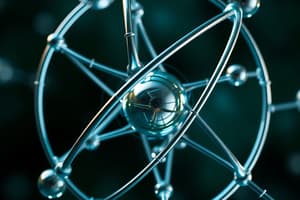Podcast
Questions and Answers
What is chemistry?
What is chemistry?
The science of matter.
Which of the following fields involve chemistry? (Select all that apply)
Which of the following fields involve chemistry? (Select all that apply)
- Agriculture (correct)
- Philosophy
- Medicine (correct)
- All of the above
Pure chemistry is focused on practical applications and production of new materials.
Pure chemistry is focused on practical applications and production of new materials.
False (B)
Which branch of chemistry deals with carbon compounds?
Which branch of chemistry deals with carbon compounds?
What does analytical chemistry focus on?
What does analytical chemistry focus on?
The ancient Mesopotamians practiced chemistry as the art of brewing __________.
The ancient Mesopotamians practiced chemistry as the art of brewing __________.
What term was derived from the Greek word for Egypt used in alchemy?
What term was derived from the Greek word for Egypt used in alchemy?
Aristotle believed that matter was composed of four elements: earth, fire, air, and water.
Aristotle believed that matter was composed of four elements: earth, fire, air, and water.
What significant shift occurred in the 1500s regarding chemistry?
What significant shift occurred in the 1500s regarding chemistry?
Who supported the shift to experimental science in the 1500s?
Who supported the shift to experimental science in the 1500s?
Flashcards are hidden until you start studying
Study Notes
Chemistry Overview
- Chemistry is the science that studies the structure, composition, and properties of matter.
- It examines the changes matter undergoes and the energy associated with those changes.
Daily Activities Involving Chemistry
- Agriculture: Use of fertilizers and pesticides.
- Cosmetics: Production of perfumes and various cosmetics.
- Medicine: Involves imaging technology, drugs, and prosthetic devices.
- Electronics: Applied in semiconductors, insulators, and electronic components.
- Military: Utilizes chemistry for firearms, gunpowder, and protective gear.
- Education Technology: Involves materials like paper, ink, and writing instruments.
- Sports: Chemistry is found in sports equipment and energy drinks.
Pure vs. Applied Chemistry
- Pure Chemistry: Focuses on acquiring knowledge for its own sake.
- Applied Chemistry: Utilizes chemical knowledge to achieve specific goals and create new materials.
Branches of Chemistry
- Inorganic Chemistry: Studies all elements and compounds except carbon compounds.
- Organic Chemistry: Focuses on carbon compounds, particularly hydrocarbons and their derivatives.
- Biochemistry: Examines compounds in living organisms and their interactions.
- Physical Chemistry: Investigates physical processes involved in chemical reactions.
- Analytical Chemistry: Analyzes the composition and quantity of substances in samples.
- Nuclear Chemistry: Explores radioactivity, nuclear processes, and properties.
Historical Perspectives in Chemistry
- Ancient Mesopotamians: Practiced brewing, metal extraction, and perfume making.
- Ancient Egyptians: Known for embalming techniques, cosmetics, and creating papyrus.
- Alchemy in Ancient Egypt: The term "Khemia" translated later to chemistry; practical techniques evolved for medical applications (iatrochemistry) blended with mystical elements.
Ancient Chinese Contributions
- Used copper for weapons and daily articles.
- Developed alchemical medicines, including disinfectants and dental materials.
- Cai Lun invented true paper; gunpowder was discovered during the Tang Dynasty.
Philosophical Roots of Chemistry
- Democritus: Proposed that the universe is made of atoms and voids.
- Aristotle: Believed matter consisted of four fundamental elements: earth, fire, air, and water.
The Scientific Method's Emergence
- Transition from alchemy to scientific methodologies began in the 1500s, supported by King Charles II.
- Formation of the Royal Society of London promoted observation and experimentation over philosophical reasoning.
- Science emphasizes ongoing testing and revision of ideas to understand the universe.
Modern Chemistry Foundations
- Evolved from a focus on alchemical practices to structured methodologies in the 16th century.
- The scientific method became the basis for developing chemistry as a rigorous discipline.
Studying That Suits You
Use AI to generate personalized quizzes and flashcards to suit your learning preferences.




